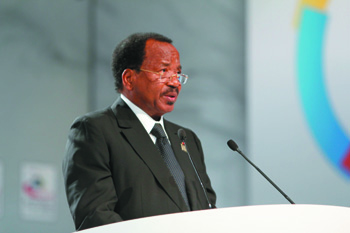 As a result of the world economic crisis between 2008 and 2009, real GDP growth slowed down, declining from 2.9% to 1.9%. Thus, the 4.5% growth rate expected for next year seems like a significant pick-up for the authorities.
As a result of the world economic crisis between 2008 and 2009, real GDP growth slowed down, declining from 2.9% to 1.9%. Thus, the 4.5% growth rate expected for next year seems like a significant pick-up for the authorities.
The growth rate of Cameroon's gross domestic product could reach 4.5% in 2012, i.e. one point more than in 2011. However the economic crisis of 2008 has had devastating effects on the sensitive areas of Cameroon's economic activity. Oil, wood, aluminium, cotton, rubber, banana and the railway sector have been severely affected.
During the same period, the terms of trade deteriorated by 18.1% in 2009 against a 22% increase in 2008. The net slump of foreign demand dealt a heavy blow on key export products, which slowed growth and aggravated the deterioration of the balance of payments and depriving the State of valuable earnings. According to the Economic Affairs Department of the Ministry of Finance, these effects combined with the decrease in oil production and energy shortages impacted negatively on the economic activities in Cameroon.
Things are much better after the crisis, as confirmed by Mauro Mecani, Head of the IMF Mission for Cameroon. "The economic resumption of Cameroon is being consolidated on a basis broadened to most sectors, after the impact of the 2008-09 world financial crisis, thanks to the prompt support of the authorities to the sectors which have been in distress and to a higher foreign demand for Cameroon's export products. Inflation has been contained so far due to the abundance of national harvests, the reduction of tax on several imported foodstuffs and policy subsidizing the price of petroleum products," analyses this IMF executive.
Thus, public funds are generally recovering with the write-off of domestic arrears and confidence is restored, as attested by the success of the 200 billion bond issue launched by the State at the end of last year.
A much-needed boost
Reassured by this success, the government has already announced another loan of 150 billion for this year, at the same time as the issuing of the Treasury bill. In the same vein, it embarked on the implementation of the Ten-Year Development Strategy contained in a Strategy Document for Economic Growth and Employment (SDEGE), now recognised as a reference framework for government action up to 2020. In accordance with the plan defined in this document, massive investments will be pursued in the road, port, railway, energy and technological infrastructures. Within this framework, a strategy based on the development of economic sectors where Cameroon has definite comparative advantages, is applied with donor support, particularly in the agro-pastoral, touristic and silvicultural sectors.
An improving business climate
Cameroon is also intensifying the reforms to improve its economic appeal and provide facilities to investors. Last year, it progressed by five places in the "Doing Business" ranking made annually by the World Bank on the competitiveness of Countries. But the country wants to do better and to that end, it is mobilizing all existing resources to improve the attractiveness of the business climate through a consultation assembly dubbed Cameroon Business Forum.
According to its organisers, the Cameroon Business Forum which held its second session in March, is a mechanism for dialogue between the public and private sectors, instituted to support the government in its efforts to improve the business climate. For example, the introduction of arbitration in the code of civil procedure as an option to resolve commercial disputes is a result of this dialogue. Likewise, the adoption of measures to simplify tax procedures and the reduction of the time limit for several transactions as well as the creation of one-stop shops for the creation of firms also emanate from one of the strong recommendations of the Cameroon Business Forum.
These incentive measures have just found a legal corpus protecting investments, particularly through the investment charter which, while reaffirming the choice of the market economy as the preferred system of economic organisation, as well as the State's essential regulating role, recognizes "the key role of the businessman, the investor and the private company as crucial wealth and job creation factors that should be given special attention by the entire State apparatus as well as the whole society" and commits the State to "preserve the freedom to run a business and the freedom to invest."
Public-private dialogue
This charter also establishes the instruments meant to accompany and guide the investor. They include the regulation and competitiveness board, the investment promotion agency and the exports promotion agency. These structures operate next to joint public-private dialogue organs like the Maritime Traffic Facilitation Committee, the One-Stop Shop for foreign trade transactions, or the Competitiveness Committee. The environment was further improved by the adoption of a law on public-private partnership. According to Lucien Sanzouango, Permanent Secretary of the Competitiveness Committee, to attract more investors, "large-scale programmes are being implemented by public authorities with donor support to improve the delivery of justice, increase the energy offer, strengthen economic information, simplify procedures, assist the companies, ensure the protection of the economic space in the face of illegal threats."


